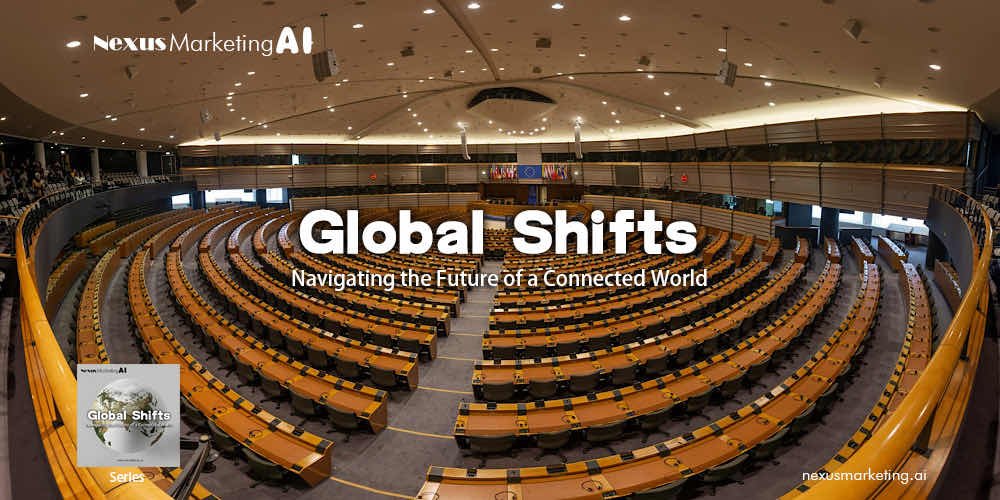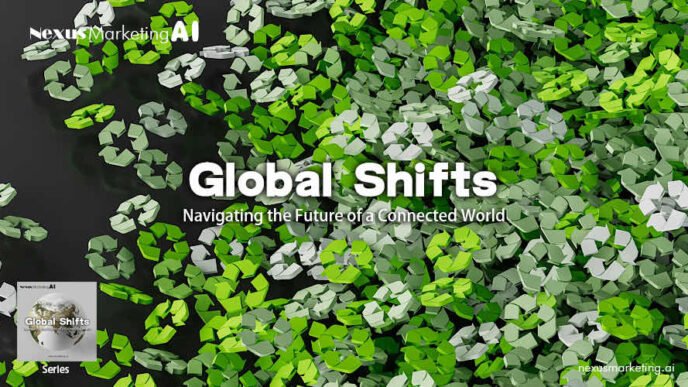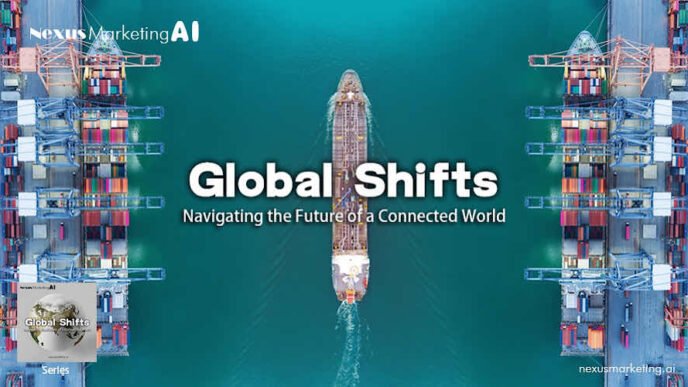Examine political globalization and its impact on global governance and multilateralism, highlighting the evolving dynamics of international cooperation.
Global Shifts
Navigating the Future of a Connected World
As the world becomes more interconnected, the forces driving globalization have far-reaching impacts on economies, businesses, and societies. This series dives deep into the core elements shaping today’s global landscape, from technological innovation and economic integration to cultural exchange and environmental sustainability.
Through a comprehensive exploration of these topics, “Global Shifts” offers thought-provoking insights into how businesses can adapt to this rapidly changing environment. Whether you’re a leader aiming to stay ahead of global trends or a professional seeking to understand the shifting dynamics of global trade, this series provides the essential knowledge to navigate the future of globalization.
Series
- Episode1.Globalization 101: Understanding the Basics
- Episode2.Economic Globalization: Trade and Investment Flows
- Episode3.Technological Globalization: The Role of Digitalization
- Episode4.Cultural Globalization: Cross-cultural Exchange and Influence
- Episode5.Political Globalization: Global Governance and Multilateralism
- Episode6.Sustainability in Globalization: Environmental Impact and Solutions
- Episode7.Global Supply Chains: Challenges and Opportunities
- Episode8.The Future of Globalization: Trends and Predictions
- Episode9.Challenges of Globalization: Inequality and Social Impacts
- Episode10.Globalization and Innovation: How Companies Stay Competitive
Table of Contents

Prefer to listen? Enjoy the audio version of this article
Curated audio version | Audio powered by AI
Defining Political Globalization
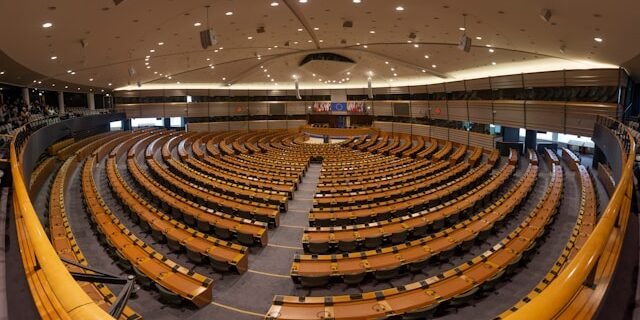
Political globalization refers to the increasing interconnectedness of political systems, institutions, and processes across national borders. It is the aspect of globalization that deals with how countries collaborate, negotiate, and manage global challenges through international organizations and multilateral agreements. In an era where issues like climate change, pandemics, and economic instability transcend national borders, political globalization has become essential for promoting peace, stability, and cooperation among nations.

Overview of Political Globalization
Political globalization involves the rise of global governance structures that facilitate cooperation between nations on a wide range of issues, from security and trade to environmental protection and human rights. It encompasses institutions such as the United Nations (UN), the World Trade Organization (WTO), and the International Monetary Fund (IMF), which play critical roles in mediating disputes, promoting international law, and providing platforms for dialogue.
Global governance is built on the premise that many contemporary challenges cannot be solved by individual countries acting alone. Instead, they require collective action through multilateralism—a system in which multiple countries work together to address common concerns. Political globalization, therefore, is not just about state-to-state relations but also involves non-state actors such as international organizations, corporations, and non-governmental organizations (NGOs), all of which influence global decision-making.

The Importance of Global Governance in an Interconnected World
In today’s interconnected world, global governance is more important than ever. Challenges like climate change, cybersecurity threats, and economic crises do not respect national borders, making cooperation between countries essential. Global governance provides a framework for coordinating policies, sharing resources, and resolving conflicts through peaceful means.
Without effective global governance, issues like economic inequality, environmental degradation, and public health emergencies could worsen, leading to instability and insecurity. By creating institutions and platforms where nations can collaborate, political globalization aims to build a more stable, just, and cooperative world order. However, the effectiveness of global governance depends on the commitment of nations to engage in multilateralism and uphold international norms.
The Role of International Organizations in Global Governance

International organizations are critical players in the global political landscape, providing the frameworks and platforms necessary for countries to cooperate on a wide range of issues. These institutions help to facilitate dialogue, mediate conflicts, and create shared rules and standards that govern international relations. By promoting peace, security, and development, international organizations play a vital role in advancing multilateralism and managing global challenges.

The United Nations: A Platform for Multilateralism
The United Nations (UN) is the most prominent and comprehensive international organization, created in 1945 with the goal of maintaining international peace and security. The UN provides a global platform for diplomacy and cooperation, bringing together 193 member states to discuss and address global issues. Its mandate covers a wide range of topics, from conflict resolution and human rights to sustainable development and humanitarian aid.
The UN’s role as a platform for multilateralism is perhaps best demonstrated through its peacekeeping missions and its involvement in brokering international agreements, such as the Paris Climate Agreement. The Security Council, a key body within the UN, has the authority to impose sanctions, authorize military interventions, and deploy peacekeeping forces to conflict zones. Through its various agencies, including UNICEF and the World Health Organization (WHO), the UN also plays a vital role in promoting human rights, health, and social welfare on a global scale.

The World Trade Organization (WTO) and Economic Globalization
The World Trade Organization (WTO) plays a pivotal role in regulating international trade and ensuring that trade flows as smoothly, predictably, and freely as possible. Established in 1995, the WTO sets the rules for global trade, mediates disputes between member countries, and promotes the reduction of trade barriers. By facilitating international commerce, the WTO supports economic globalization and helps countries benefit from the efficiencies and opportunities that global markets offer.
The WTO’s multilateral framework allows countries to negotiate trade agreements that promote open markets while balancing the interests of developed and developing economies. However, the organization has faced criticism for being slow to adapt to modern challenges, such as the rise of digital commerce and protectionist policies. Despite these challenges, the WTO remains central to global trade governance, promoting economic integration and resolving trade disputes.

The International Monetary Fund (IMF) and World Bank
The International Monetary Fund (IMF) and the World Bank are two of the most important institutions in global financial governance. Both were established in the aftermath of World War II to promote international financial stability and economic development. The IMF focuses on providing short-term financial assistance to countries facing balance-of-payments crises, while the World Bank offers long-term loans and grants to support development projects in low- and middle-income countries.
The IMF plays a key role in stabilizing the global financial system, offering policy advice and financial support to countries in economic distress. The World Bank, on the other hand, funds projects that promote infrastructure development, education, healthcare, and poverty reduction. Together, these institutions support the financial stability and economic growth of nations around the world, particularly in developing regions.
The Role of Regional Organizations (EU, ASEAN, AU)
Regional organizations, such as the European Union (EU), the Association of Southeast Asian Nations (ASEAN), and the African Union (AU), also play important roles in global governance. These organizations provide platforms for countries within specific regions to cooperate on political, economic, and security issues. The EU, for instance, has developed a unique model of political and economic integration that allows its member states to share sovereignty in areas like trade, environmental policy, and human rights.
Similarly, ASEAN promotes economic cooperation and political stability among its Southeast Asian members, while the AU fosters political unity and development across Africa. These regional bodies complement global organizations like the UN and WTO by addressing specific regional challenges and promoting stability within their regions. Through regional cooperation, countries can address issues that may be unique to their geographic or cultural context while still contributing to broader global governance efforts.
Global Governance in Addressing International Crises

International crises—whether they be environmental, health-related, or security-oriented—require collective action, often beyond the capabilities of individual nations. Global governance, through international organizations and multilateral agreements, provides a framework for managing and resolving these crises. As the world becomes more interconnected, the need for effective global governance to address cross-border crises is more pressing than ever.
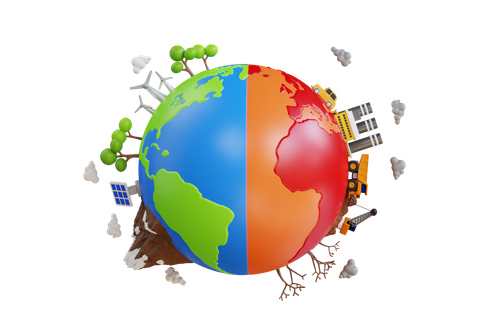
Climate Change and Environmental Agreements
Climate change is one of the most urgent global challenges, and no single country can address it alone. The impact of rising global temperatures, extreme weather events, and environmental degradation are felt worldwide, requiring coordinated international action. Global governance, through multilateral environmental agreements such as the Paris Agreement, brings countries together to collectively reduce greenhouse gas emissions and promote sustainable development.
The Paris Agreement, adopted in 2015, is a landmark in the fight against climate change, with nearly every country pledging to limit global temperature rise to well below 2 degrees Celsius. This agreement reflects the power of multilateralism, as it enables countries to set individual goals while holding each other accountable for their contributions to the global effort. Other environmental agreements, such as the Kyoto Protocol and the Montreal Protocol, also highlight the role of global governance in addressing environmental crises.

Global Health Governance: Lessons from the COVID-19 Pandemic
The COVID-19 pandemic demonstrated the critical importance of global health governance. The World Health Organization (WHO), as the leading international body in global health, played a central role in coordinating responses to the pandemic, providing guidance, and facilitating the distribution of medical resources. The pandemic revealed both the strengths and limitations of global health governance, as countries struggled to balance national interests with the need for international cooperation.
Global health crises like COVID-19 underscore the interconnectedness of the world’s health systems and the need for a coordinated global response. Beyond pandemics, global health governance addresses a wide range of issues, including disease prevention, health equity, and access to vaccines. The lessons learned from the pandemic will likely shape future approaches to global health, including how international organizations and governments work together to prevent and manage future crises.

International Security and Peacekeeping
International security has been a central concern of global governance, particularly through institutions like the United Nations Security Council. The UN’s peacekeeping missions are one of the most visible forms of multilateral intervention in conflict zones, where peacekeepers work to stabilize post-conflict regions, protect civilians, and assist in political transitions. From the Balkans to Africa, these missions reflect the collective commitment of the international community to maintain global peace and security.
However, international security governance is not without its challenges. Geopolitical rivalries, the rise of non-state actors like terrorist groups, and the proliferation of nuclear weapons have complicated efforts to maintain global peace. The rise of cyber warfare and other non-traditional security threats also present new challenges for international security governance. Multilateral cooperation through international agreements, such as nuclear non-proliferation treaties and arms control agreements, remains essential to addressing these evolving security threats.
Challenges to Multilateralism and Global Governance

While multilateralism and global governance have proven essential in addressing global issues, they face significant challenges in the modern world. From the rise of nationalism to the structural limitations of international organizations, these challenges threaten the effectiveness of global cooperation. Understanding these obstacles is key to strengthening the global governance framework and ensuring that it remains effective in an increasingly complex world.

The Rise of Nationalism and Populism
In recent years, there has been a resurgence of nationalism and populism in various parts of the world. Movements such as Brexit in the United Kingdom and the “America First” policy in the United States reflect a growing backlash against globalization and multilateral cooperation. These movements prioritize national sovereignty and self-interest, often at the expense of international agreements and institutions.
Nationalism challenges multilateralism by undermining the collective decision-making processes that are necessary for addressing global issues. For instance, countries that prioritize unilateral actions over cooperative solutions can hinder progress in areas such as climate change, trade, and security. As nationalism gains ground, multilateral institutions like the United Nations and the World Trade Organization face increasing difficulty in promoting global cooperation.

The Limitations of Global Institutions
Global governance institutions, despite their critical roles, often suffer from structural limitations that impede their effectiveness. These institutions, such as the United Nations and the World Trade Organization, are frequently criticized for being slow to respond to crises and for being overly bureaucratic. Additionally, they often struggle to enforce their decisions, as compliance is largely dependent on the political will of member states.
For example, the United Nations Security Council has been criticized for its inability to act decisively in the face of geopolitical conflicts, often due to the veto power held by its five permanent members (the U.S., Russia, China, France, and the U.K.). Similarly, the World Trade Organization has faced difficulties in updating trade rules to reflect modern economic realities, such as the rise of digital commerce, due to the conflicting interests of its member states.

Power Imbalances in International Organizations
Another significant challenge to global governance is the power imbalance between developed and developing countries within international organizations. Many global institutions, including the International Monetary Fund (IMF) and the World Bank, are perceived to be dominated by wealthy nations, which can lead to policies that disproportionately favor the interests of developed countries. This has led to criticisms that the voices of smaller or developing nations are often marginalized in global decision-making processes.
For instance, the structure of the IMF gives more voting power to countries that contribute larger financial resources, which means that decisions are often shaped by the interests of the U.S., the European Union, and other wealthy nations. Developing countries have called for reforms to ensure that global institutions are more inclusive and reflective of the needs of the broader international community. Addressing these power imbalances is crucial for ensuring that global governance remains legitimate and effective.
The Future of Multilateralism and Global Governance

As global challenges evolve, so too must the structures and processes of global governance. Strengthening multilateralism and reforming international institutions will be essential for addressing the increasingly complex issues that transcend national borders, such as climate change, cybersecurity, and global inequality. The future of multilateralism depends on the ability of the international community to adapt, innovate, and work together to create a more inclusive and responsive global governance system.

Reforming International Organizations
To remain relevant and effective, international organizations must undergo reforms that reflect the changing global landscape. The United Nations, for example, has faced calls for reform, particularly in the composition and functioning of the Security Council. Critics argue that the current structure, with its five permanent members holding veto power, no longer reflects the geopolitical realities of the 21st century. Expanding the Security Council to include emerging powers such as India and Brazil, or limiting the use of the veto, could make the UN more representative and effective.
Similarly, institutions like the International Monetary Fund (IMF) and the World Trade Organization (WTO) need to adapt to new economic realities, including the rise of digital commerce, the gig economy, and global supply chains. Modernizing these institutions to address contemporary economic issues will be key to ensuring that they can continue to support global economic stability and development.

The Role of Emerging Powers in Global Governance
Emerging powers such as China, India, and Brazil are increasingly playing important roles in global governance. These countries, often referred to as the “Global South,” have become major players in international trade, diplomacy, and development. As their influence grows, these nations are seeking greater representation and decision-making power within global institutions. For example, China’s growing involvement in the United Nations and its leadership in global initiatives such as the Belt and Road Initiative reflect its increasing role in shaping global governance.
The rise of these emerging powers presents both opportunities and challenges for multilateralism. On one hand, their participation can make global governance more inclusive and reflective of diverse perspectives. On the other hand, tensions between established powers (like the U.S. and Europe) and emerging powers (like China and India) could complicate international cooperation if interests diverge.

Multilateralism in the Digital Age
The digital revolution has transformed every aspect of global governance, creating new challenges and opportunities for multilateral cooperation. Cybersecurity, data privacy, and the regulation of artificial intelligence (AI) are now critical areas where global governance must adapt. The rise of the digital economy has created new forms of global interdependence, requiring international organizations to address issues that were previously non-existent or less prominent.
For instance, cyberattacks on critical infrastructure, election interference, and the misuse of AI pose new security threats that transcend national borders. International cooperation is essential to developing global norms, regulations, and frameworks for managing these risks. The creation of multilateral agreements on cybersecurity and data governance will be crucial for ensuring global digital security in the years to come.
The Path Forward for Global Governance

The world today faces a wide range of complex challenges that no single nation can address alone. From climate change to cybersecurity threats and global pandemics, the interconnected nature of these issues requires collaborative solutions that transcend borders. Global governance, through multilateralism, provides the framework for nations to work together in addressing these challenges and building a more stable and equitable world.

Strengthening Cooperation in a Fragmented World
In an era marked by rising nationalism and geopolitical tensions, strengthening multilateral cooperation is more important than ever. International institutions must continue to foster dialogue, build consensus, and create platforms for collaboration. Multilateral agreements on trade, climate, health, and security are essential to creating a stable global order. By reaffirming their commitment to multilateralism, nations can ensure that global governance remains an effective tool for promoting peace, prosperity, and sustainability.

The Need for Inclusive and Adaptive Governance
As global power dynamics shift and new challenges emerge, global governance must become more inclusive and adaptive. Reforms to international organizations that give a greater voice to developing countries, emerging economies, and marginalized groups will make global governance more legitimate and effective. At the same time, international institutions must be flexible enough to respond quickly to new global issues, from pandemics to technological disruptions, ensuring that they remain relevant in an ever-changing world.

Link to Next Episode: Sustainability in Globalization
The next episode, “Sustainability in Globalization: Environmental Impact and Solutions,” will explore how globalization has impacted the environment and the role of global governance in addressing environmental challenges. This episode will discuss the environmental consequences of global trade, the role of multilateral agreements like the Paris Agreement, and innovative solutions for creating a more sustainable global economy.
FAQs
-
What is political globalization, and how does it differ from economic globalization?
Political globalization refers to the increasing interconnectedness of national governments and the rise of international organizations that influence global governance. Unlike economic globalization, which focuses on trade and investment, political globalization involves the coordination of policies, treaties, and cooperation on global issues such as security, human rights, and environmental protection.
-
How do international organizations contribute to global governance?
International organizations, such as the United Nations (UN), World Trade Organization (WTO), and International Monetary Fund (IMF), play crucial roles in global governance by setting international standards, mediating conflicts, and providing platforms for cooperation. They help countries address global challenges collectively, such as climate change, trade disputes, and humanitarian crises, by fostering dialogue and facilitating agreements.
-
What is multilateralism, and why is it important?
Multilateralism is a system of coordinating relations between three or more countries through international institutions or agreements. It is important because it promotes collective action on global issues, encourages diplomacy over unilateral decisions, and helps maintain international peace and stability. Multilateralism allows nations to work together on shared challenges, from economic crises to environmental sustainability.
-
How does political globalization impact national sovereignty?
Political globalization can challenge national sovereignty as countries increasingly adhere to international agreements and regulations. While global governance allows for coordinated responses to global problems, it also requires nations to cede some control over their domestic policies. This can lead to tensions when international mandates conflict with national interests or local priorities.
-
What role does the United Nations play in political globalization?
The United Nations (UN) is one of the most prominent international organizations influencing political globalization. It promotes international cooperation through its various bodies, such as the General Assembly, Security Council, and specialized agencies like UNICEF and WHO. The UN works on peacekeeping, conflict resolution, human rights, and sustainable development, making it a key player in shaping global governance.
-
How does political globalization address global security challenges?
Political globalization facilitates international cooperation on security issues through alliances, treaties, and organizations like NATO and the UN Security Council. These bodies work together to address threats such as terrorism, nuclear proliferation, and cyberattacks. Political globalization enables countries to share intelligence, coordinate military responses, and impose sanctions to maintain global peace and security.
-
What are the criticisms of global governance institutions?
Global governance institutions often face criticism for being bureaucratic, slow to respond, and sometimes biased towards the interests of powerful nations. Critics argue that these organizations can lack transparency and accountability, and their decision-making processes may not adequately represent smaller or developing countries. Reforms are often called for to make these institutions more inclusive and effective.
-
How do trade agreements influence political globalization?
Trade agreements, such as the European Union (EU), North American Free Trade Agreement (NAFTA), and Trans-Pacific Partnership (TPP), influence political globalization by setting rules that govern economic interactions between countries. These agreements often include provisions on labor, environmental standards, and dispute resolution, which require countries to align their domestic policies with international standards, further integrating them into the global political landscape.
-
What is the role of non-governmental organizations (NGOs) in political globalization?
NGOs play a significant role in political globalization by advocating for social, environmental, and human rights issues at the international level. Organizations like Amnesty International, Greenpeace, and Médecins Sans Frontières (Doctors Without Borders) influence policy, raise awareness, and provide on-the-ground support during crises. NGOs help shape global governance by holding governments and corporations accountable for their actions.
-
How is political globalization evolving in the face of rising nationalism?
Political globalization faces challenges from the rise of nationalism and populist movements, which often prioritize national interests over international cooperation. This shift has led to increased skepticism of multilateral institutions and calls for more protectionist policies. Despite these challenges, global issues such as climate change, pandemics, and economic inequality continue to drive the need for coordinated international responses, pushing political globalization to adapt to a more fragmented world.

